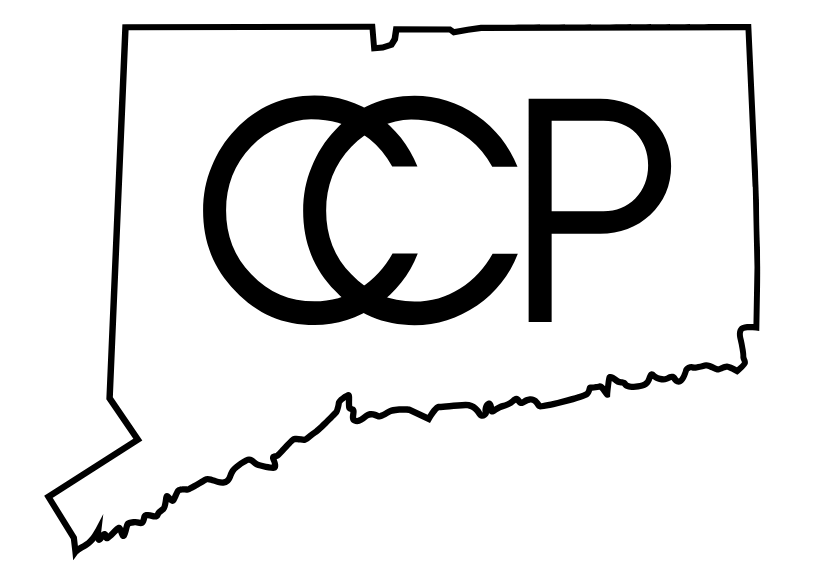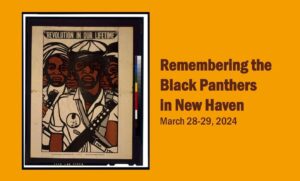Black Panthers Conference
“Remembering the Black Panthers in New Haven” was a symposium held at Wesleyan University on March 28thand 29th, 2024 and sponsored by the Carceral CT Project, a research cluster funded by the Mellon foundation. The symposium brought together scholars and community members to talk about the political impact of the New Haven Chapter of the Black Panther Parties in 1969-1971. The event began with a keynote address by Prof. Yohuru Williams (University of St. Thomas), the author of Black Politics/White Power: Civil Rights, Black Power, and the Black Panthers in New Haven, who spoke about the echoes of BPP in the legal system today. He discussed the importance of thinking about how the police and the court system continue to fail Black citizens in a variety of ways. He also saw a throughline in the disenfranchisement of Black people from juries thwarting justice at many key moments, including in the case he is currently researching, Neal v Delaware (1880). In Neal, the Supreme Court found the state to be in error when it denied any persons “of African origin” to serve as jurors in the case of William Neal, a Black man accused of rape.
At the first roundtable on Friday, Willa Sachs (Yale University) spoke about the constitutional thinking of Black Panther leadership that led to a call for all-Black juries. Sachs also spoke about how the BPP organized people’s tribunals where they would conduct alternative court proceedings and offer verdicts. Then we heard from Mandi Jackson who spoke about the Mayor Richard C. Lee’s visions for urban renewal in New Haven and the countermobilization of Black citizens, such as through the Hill Parents Association, organized by residents whose homes were often slated to be demolished. Mary Philips (Lehman College, CUNY) offered a reflection about how Ericka Huggins, New Haven Chapter Leader of the Black Panthers, cultivated joy during her time in prison before and during her trial in 1971. Philips highlighted Huggins’ friendship with one of the prison guards, the pleasure she took in fashion, and creating her own self-image as methods of maintaining a spiritual outlook and faith in the humanity of herself and those around her. Lastly, Sonali Chakravarti (Wesleyan University) recalled how the voir dire for the trial of Bobby Seale and Ericka Huggins is often thought to be the longest jury selection in Connecticut history because so many potential jurors had strong feelings about the case and the intense amount of publicity surrounding the Black Panthers. At the same time, defense attorney Charles Garry formulated questions about white jurors’ familiarity with Black life that resonate today as courts are trying to stem the improper dismissal of Black jurors.
The second roundtable began with personal testimony from Maleek Jones who spent 31 years in a Connecticut prison before a federal judge overturned his homicide conviction in September 2023 because of prosecutorial misconduct and the failure of defense counsel to call a key eyewitness. Jones was still under federal supervision as the state appealed the decision. Reflecting on the theme of the conference, Jones mentioned that he learned about the Black Panthers and other political movements while in prison from inmates who were taking college courses. James Binnall (Cal State Long Beach) spoke next about how California recently lifted the ban on formerly incarcerated people (those with felony convictions) serving as jurors. Binall had spoken to lawmakers about his own experiences studying for the LSAT in prison prior to the bill, and is working with formerly incarcerated students at his university today. Daudi Justin, a lawyer with the Neighborhood Defender Service, then discussed the class action lawsuit he had filed against New York State to allow formerly incarcerated residents to serve as jurors. Previously incarcerated himself, Justin took on the challenge when the NY Civil Liberties Union was looking for someone to serve as lead plaintiff in the case. Lastly, Premal Dharia addressed how lawyers and judges should work to change the meaning of “reasonable person” as it is often used in the law. She said that many criminal charges, such as those relating to self-defense, ask jurors to think about what a “reasonable person” might do and base their verdict on such a judgment. There is room for lawyers to make explicit for jurors that the “reasonable person” might be the “reasonable Black man,” a category that would invite jurors to think about the particular life experiences and interactions with law enforcement that hinge on race, and incorporate this context in their deliberations.

